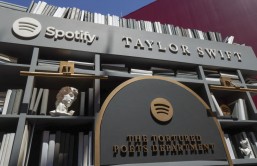Hobby Lobby's founding family is planning to convert the Washington Design Center into a museum that will be dedicated to the Bible, the New York Times reported Thursday. The billion-dollar craft store chain recently won a legal battle when the Supreme Court ruled that the company cannot be forced to include birth control for employees in its insurance coverage.
Brought by Steve Green, the son of Hobby Lobby's founder and the company's current president, for $50 million in 2012, he plans to spend a large chunk of his family's cash, plus private donor money, stocking the eight-story museum with more than 40,000 Bible-related artifacts, New York Daily News reported. At a splitting distance from the Capitol, the $800 million project will also house religious artifacts and rare volumes that Green began collecting five years ago.
Among Green's religious collection of treasures is one of the earliest versions of the New Testament written in Jesus' native tongue, Aramaic. "These are huge things that any museum, to have a portion of them, would be honored to have," Scott Carroll, an archeologist who advised Green, told the Times.
But some opponents of the Hobby Lobby verdict claimed that the Museum of the Bible could potentially be used to push Green and Co.'s evangelical Christian agenda. David and Barbara Green, who founded Hobby Lobby, and their son are evangelical Protestants who keep their stores closed on Sunday.
Annie Laurie Gaylor, co-president of the Freedom From Religion Foundation, told the Times she saw the company as a "great threat." "My instincts would tell me that they are choosing Washington, D.C., because they intend to influence Congress," she said.
However, Green refused to talk to the Times. "This nation is in danger because of its ignorance of what God has taught," Green said last year in a New York speech. "There are lessons from the past that we can learn from, the dangers of ignorance of this book. We need to know it. If we don't know it, our future is going to be very scary."
Since the building, which opened in the 1920s, stands as a historic landmark, the project must still be approved by Washington's historic preservation review board, UPI reported. A decision is expected to be issued at the end of the month.








